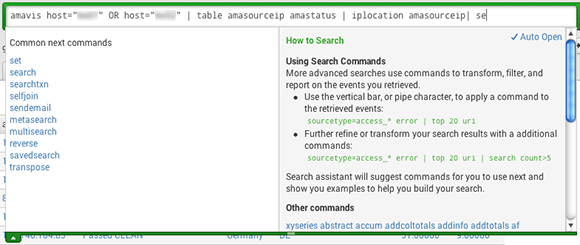

Initial Confidence and Impact is set by the analytic author. The Risk Score is calculated by the following formula: Risk Score = (Impact * Confidence/100). Path traversal exploitation attempt from $clientip$ This search may find additional path traversal exploitation attempts or malformed requests. This detection will not work against obfuscated path traversal requests. This detection is meant for on premise environments, and if executed on internet facing servers without a WAF may produce a lot of results. that specify which events you want to retrieve from the index (es).

These search terms are keywords, phrases, boolean expressions, key/value pairs, etc. The detection does require the ability to search the _internal index. A Splunk search starts with search terms at the beginning of the pipeline. This detection does not require you to ingest any new data. List of fields required to use this analytic. It allows the user to filter out any results (false positives) without editing the SPL. Splunk_path_traversal_in_splunk_app_for_lookup_file_edit_filter is a empty macro by default. | `splunk_path_traversal_in_splunk_app_for_lookup_file_edit_filter` | stats count by clientip namespace lookup_file uri_query In contrast, the search with search and != in the following example doesn't return any events because all of the events with field City where the field Country is null are excluded.| table clientip uri_query lookup_file owner namespace version Also, the Country field is displayed, but the values are null. As a result, 5 events are displayed for the City field, even though a Country field was not defined for those events. This search returns the union of two groups of events: events where the field Country is defined and has a value not equal to "Canada" and events where the field Country is not defined. | makeresults count=5 | eval city="Ontario"

| makeresults count=5 | eval Country="Canada" The search with regex and != in the following example creates 5 events with Country="Canada" and 5 events with City="Ontario", and filters on events where Country does not equal "Canada". This example uses a negative lookbehind assertion at the beginning of the expression. If you use != in the context of the regex command, keep this behavior in mind and make sure you want to include null fields in your results.Įxample 1: Keep only search results whose "_raw" field contains IP addresses in the non-routable class A (10.0.0.0/8). For example, this search will not include events that do not define the field Location. You can use a search command with != to filter for events that don't contain a field matching the search string, and for which the field is defined. The search command behaves the opposite way. For example, this search will include events that do not define the field Location. You can use a regex command with != to filter for events that don't have a field value matching the regular expression, or for which the field is null. If you use regular expressions in conjunction with the regex command, note that != behaves differently for the regex command than for the search command.

Use the rex command to either extract fields using regular expression named groups, or replace or substitute characters in a field using sed expressions. Use the regex command to remove results that match or do not match the specified regular expression.
rex fieldFullyQualifiedUserName '.+/ (The difference between the regex and rex commands 1 Answer Sorted by: 1 I have no Splunk instance close to me but maybe this will help you. See SPL and regular expressions in the Search Manual.Īlthough != is valid within a regex command, NOT is not valid.įor general information about regular expressions, see About Splunk regular expressions in the Knowledge Manager Manual. When you use regular expressions in searches, you need to be aware of how characters such as pipe ( | ) and backslash ( \ ) are handled. The regex command is a distributable streaming command. To keep results that do not match, specify !=. You can specify that the regex command keeps results that match the expression by using =. Optional arguments Syntax: Description: Specify the field name from which to match the values against the regular expression.
The regular expression must be a Perl Compatible Regular Expression supported by the PCRE library. 1 Solution Solution sowings Splunk Employee 11-07-2012 10:22 AM Given that that the difference is the prefix, and the formatting of the address is the same, I might do something like this: (DENIEDsrc)\s-\s (Regex (= | != | ) Required arguments Syntax: "" Description: An unanchored regular expression. Removes results that match or do not match the specified regular expression.


 0 kommentar(er)
0 kommentar(er)
